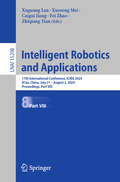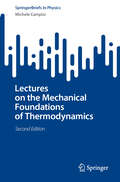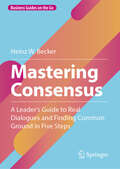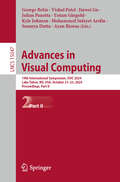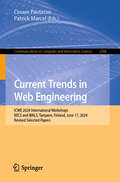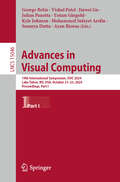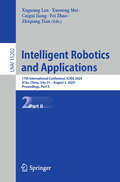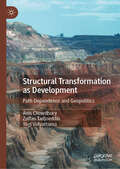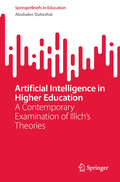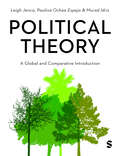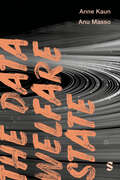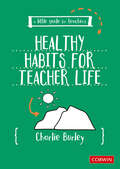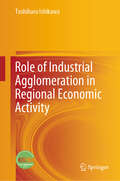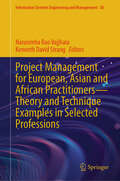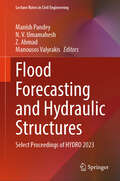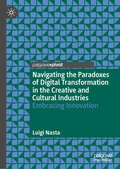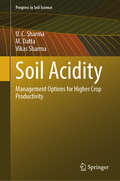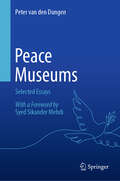- Table View
- List View
Intelligent Robotics and Applications: 17th International Conference, ICIRA 2024, Xi'an, China, July 31 – August 2, 2024, Proceedings, Part VIII (Lecture Notes in Computer Science #15208)
by Xuguang Lan Xuesong Mei Caigui Jiang Fei Zhao Zhiqiang TianThe 10-volume set LNAI 15201-15210 constitutes the proceedings of the 17th International Conference on Intelligent Robotics and Applications, ICIRA 2024, which took place in Xi’an, China, during July 31–August 2, 2024. The 321 full papers included in these proceedings were carefully reviewed and selected from 489 submissions. They were organized in topical sections as follows: Part I: Innovative Design and Performance Evaluation of Robot Mechanisms. Part II: Robot Perception and Machine Learning; Cognitive Intelligence and Security Control for Multi-domain Unmanned Vehicle Systems. Part III: Emerging Techniques for Intelligent Robots in Unstructured Environment; Soft Actuators and Sensors; and Advanced Intelligent and Flexible Sensor Technologies for Robotics. Part IV: Optimization and Intelligent Control of Underactuated Robotic Systems; and Technology and application of modular robots. Part V: Advanced actuation and intelligent control in medical robotics: Advancements in Machine Vision for Enhancing Human-Robot Interaction; and Hybrid Decision-making and Control for Intelligent Robots. Part VI: Advances in Marine Robotics; Visual, Linguistic, Affective Agents: Hybrid-augmented Agents for Robotics; and Wearable Robots for Assistance, Augmentation and Rehabilitation of human movements. Part VII: Integrating World Models for Enhanced Robotic Autonomy; Advanced Sensing and Control Technologies for Intelligent Human-Robot Interaction; and Mini-Invasive Robotics for In-Situ Manipulation. Part VIII: Robot Skill Learning and Transfer; Human-Robot Dynamic System: Learning, Modelling and Control; AI-Driven Smart Industrial Systems; and Natural Interaction and Coordinated Collaboration of Robots in Dynamic Unstructured Environments. Part IX: Robotics in Cooperative Manipulation, MultiSensor Fusion, and Multi-Robot Systems; Human-machine Co-adaptive Interface; Brain inspired intelligence for robotics; Planning, control and application of bionic novel concept robots; and Robust Perception for Safe Driving. Part X: AI Robot Technology for Healthcare as a Service; Computational Neuroscience and Cognitive Models for Adaptive Human-Robot Interactions; Dynamics and Perception of Human-Robot Hybrid Systems; and Robotics for Rehabilitation: Innovations, Challenges, and Future Directions.
Lectures on the Mechanical Foundations of Thermodynamics (SpringerBriefs in Physics)
by Michele CampisiThis book provides a modern pedagogical exposition of the mechanical approach to statistical mechanics initiated by Boltzmann with his early works (1866–1871). Despite the later contribution by Helmholtz, Boltzmann himself (1884–1887), Gibbs, P. Hertz, and Einstein, the mechanical approach remained almost unknown to the modern reader, in favour of the celebrated combinatorial approach, developed by Boltzmann himself during his probabilistic turn (1876–1884). The brief constitutes an ideal continuation of a graduate course of classical mechanics and requires knowledge of basic calculus in many dimensions (including differential forms), thermodynamics, and probability theory, besides Hamiltonian mechanics. The cornerstone of the whole presentation is the ergodic hypothesis. Special attention is devoted to Massieu potentials (the Legendre transforms of the entropy) which are most natural in statistical mechanics and also allow for a more direct treatment of the topic of ensemble equivalence. In this second edition, a chapter is added that addresses the long-debated question of how the second law of thermodynamics can be reconciled with mechanics, by using modern methods of non-equilibrium statistical mechanics.
Mastering Consensus: A Leader's Guide to Real Dialogues and Finding Common Ground in Five Steps (Business Guides on the Go)
by Heinz W. BeckerAchieving a common purpose begins with diverse ideas and opinions. This book guides managers through a five-step process to transform productive controversy into unified action. Mastering these steps helps managers stay grounded and effective, even in turbulent times. Learn to handle difficult candidates, manage rivalry and hierarchy, and navigate chaotic discussions. The author introduces innovative concepts on hierarchy, authority, and leadership styles. The message of the book emphasizes recognizing and using “magic moments” in discussions and promoting good will without imposing values. The steps provided in the book help unlock the secrets to effective consensus-building and leadership with practical strategies and insights. This book is essential for managers seeking to foster collaboration and drive successful outcomes.
Advances in Visual Computing: 19th International Symposium, ISVC 2024, Lake Tahoe, NV, USA, October 21–23, 2024, Proceedings, Part II (Lecture Notes in Computer Science #15047)
by George Bebis Vishal Patel Kyle Johnsen Jinwei Gu Julian Panetta Yotam Gingold Mohammed Safayet Arefin Soumya Dutta Ayan BiswasThis two-volume set LNCS 15046 and 15047 constitutes the refereed proceedings of the 17th International Symposium, ISVC 2024, held at Lake Tahoe, NV, USA, during October 21-23, 2024. The 54 (60) full papers and 12 poster papers were carefully reviewed and selected from 120 submissions. A total of 8 (13) papers were also accepted for oral presentation in special tracks from 15 submissions. The papers cover the following topical sections: Part I: Deep Learning; Computer Graphics; Video Analysis and Event Recognition; Motion and Tracking; Detection and Recognition; Visualization, and Medical Image Analysis. Part II: Segmentation; Recognition; Generalization in Visual Machine Learning; Vision and Robotics for Agriculture; Virtual Reality; Applications, and Poster.
Current Trends in Web Engineering: ICWE 2024 International Workshops, BECS and WALS, Tampere, Finland, June 17, 2024, Revised Selected Papers (Communications in Computer and Information Science #2188)
by Cesare Pautasso Patrick MarcelThis volume constitutes the papers of two workshops which were held in conjunction with the International Conference on Web Engineering, ICWE 2024, held in Tampere, Finland, on June 17, 2024. The 6 revised full papers and 2 short papers presented in this book were carefully reviewed and selected from 14 submissions. They stem from the following workshops: Fourth International Workshop on Big Data Driven Edge Cloud Services (BECS 2024) Third International Workshop on Web Applications for Life Sciences (WALS 2024)
Advances in Visual Computing: 19th International Symposium, ISVC 2024, Lake Tahoe, NV, USA, October 21–23, 2024, Proceedings, Part I (Lecture Notes in Computer Science #15046)
by George Bebis Vishal Patel Kyle Johnsen Jinwei Gu Julian Panetta Yotam Gingold Mohammed Safayet Arefin Soumya Dutta Ayan BiswasThis two-volume set LNCS 15046 and 15047 constitutes the refereed proceedings of the 17th International Symposium, ISVC 2024, held at Lake Tahoe, NV, USA, during October 21-23, 2024. The 54 full papers and 12 poster papers were carefully reviewed and selected from 120 submissions. A total of 8 papers were also accepted for oral presentation in special tracks from 15 submissions. The papers cover the following topical sections: Part I: Deep Learning; Computer Graphics; Video Analysis and Event Recognition; Motion and Tracking; Detection and Recognition; Visualization, and Medical Image Analysis. Part II: Segmentation; Recognition; Generalization in Visual Machine Learning; Vision and Robotics for Agriculture; Virtual Reality; Applications, and Poster.
Intelligent Robotics and Applications: 17th International Conference, ICIRA 2024, Xi’an, China, July 31 – August 2, 2024, Proceedings, Part II (Lecture Notes in Computer Science #15202)
by Xuguang Lan Xuesong Mei Caigui Jiang Fei Zhao Zhiqiang TianThe 10-volume set LNAI 15201-15210 constitutes the proceedings of the 17th International Conference on Intelligent Robotics and Applications, ICIRA 2024, which took place in Xi’an, China, during July 31–August 2, 2024. The 321 full papers included in these proceedings were carefully reviewed and selected from 489 submissions. They were organized in topical sections as follows: Part I: Innovative Design and Performance Evaluation of Robot Mechanisms. Part II: Robot Perception and Machine Learning; Cognitive Intelligence and Security Control for Multi-domain Unmanned Vehicle Systems. Part III: Emerging Techniques for Intelligent Robots in Unstructured Environment; Soft Actuators and Sensors; and Advanced Intelligent and Flexible Sensor Technologies for Robotics. Part IV: Optimization and Intelligent Control of Underactuated Robotic Systems; and Technology and application of modular robots. Part V: Advanced actuation and intelligent control in medical robotics: Advancements in Machine Vision for Enhancing Human-Robot Interaction; and Hybrid Decision-making and Control for Intelligent Robots. Part VI: Advances in Marine Robotics; Visual, Linguistic, Affective Agents: Hybrid-augmented Agents for Robotics; and Wearable Robots for Assistance, Augmentation and Rehabilitation of human movements. Part VII: Integrating World Models for Enhanced Robotic Autonomy; Advanced Sensing and Control Technologies for Intelligent Human-Robot Interaction; and Mini-Invasive Robotics for In-Situ Manipulation. Part VIII: Robot Skill Learning and Transfer; Human-Robot Dynamic System: Learning, Modelling and Control; AI-Driven Smart Industrial Systems; and Natural Interaction and Coordinated Collaboration of Robots in Dynamic Unstructured Environments. Part IX: Robotics in Cooperative Manipulation, MultiSensor Fusion, and Multi-Robot Systems; Human-machine Co-adaptive Interface; Brain inspired intelligence for robotics; Planning, control and application of bionic novel concept robots; and Robust Perception for Safe Driving. Part X: AI Robot Technology for Healthcare as a Service; Computational Neuroscience and Cognitive Models for Adaptive Human-Robot Interactions; Dynamics and Perception of Human-Robot Hybrid Systems; and Robotics for Rehabilitation: Innovations, Challenges, and Future Directions.
Structural Transformation as Development: Path Dependence and Geopolitics
by Anis Chowdhury Zulfan Tadjoeddin Yogi VidyattamaThis book evaluates development progress using the lens of structural transformation in four groups of developing countries: Africa’s least developed countries (LDCs), Asia’s LDCs, landlocked Central Asian countries, and Pacific small island states. The analysis presented is contextualized in the diverse economic characteristics and geopolitical landscape of the four categories of countries. In doing so, research on Africa’s LDCs emphasizes the overall picture of missed economic opportunities, while the research on Asia's LDCs focus on policy lessons. The chapter on landlocked Central Asian countries focuses more on the unique transition experience of those countries coming out from USSR hinterlands to independent states in the wake of the third wave of democratisation in the 1990s. Lastly the evaluation of Pacific small island states is very much influenced by the fate of geography for being small in size and remotely located. The diverse coverage offers readers rich varieties of structural transformation experiences and comparative development perspectives. The book is non-technical, with descriptive, narrative, and analytical approaches on comparative development, making it suitable and accessible for non-specialist audiences.
Artificial Intelligence in Higher Education: A Contemporary Examination of Illich's Theories (SpringerBriefs in Education)
by Abubaker QutieshatThis book is multi-dimensional exploration of Ivan Illich's critique of institutionalized education. It dissects, analyzes, and understands the implications of his critique for the future of education in a world increasingly influenced by technology, particularly artificial intelligence (AI). The book outlines the problems with current educational systems and discusses potential alternatives, considering the role of modern technology like AI. It employs a multi-disciplinary approach, incorporating historical analysis, philosophical inquiry, and practical considerations to explore Illich's critique. Readers will be equipped with the knowledge to critically assess the educational landscape and consider viable alternatives for reform. This book contributes to the field of educational theory and practice in its nuanced understanding of Illich's critique and its implications for educational reform. It serves as both a theoretical exploration and a practical guide, making it a valuable resource for a wide range of readers, including educators, policymakers, students, and anyone interested in the future of education.
Political Theory: A Global and Comparative Introduction
by Leigh Jenco Paulina Ochoa Espejo Murad IdrisThis groundbreaking work presents a transformative perspective on political theory. This text is not just an introduction to political theory, it′s a call to broaden the discipline′s horizons, making it more globally aware and methodologically diverse. The authors introduce a novel approach to political theory that expands the scope of the discipline beyond traditional philosophical texts and Eurocentric perspectives. The text integrates canonical Western texts with diverse sources of political thought from a wide range of times and places – spanning the Vedas to the Quran, the Upanishads to the Popol Vuh. This is the first introductory text to incorporate such a variety of texts and authors with each thinker (whether Plato or Laozi, Du Bois or Confucius) introduced in a way that’s both accessible and relevant today. The text also demonstrates the possibilities for comparison and connections in teaching political theory. Cross-cutting themes of gender, race and colonialism connect disparate ideas across time periods and geographies, forging a comprehensive network of political thought. This pioneering textbook reshapes the way political theory is taught and understood and is an essential companion for all undergraduate and postgraduate students of political theory as much as it will be for anyone interested in global political thought. This text is a must-read for anyone looking to understand the full spectrum of political thought and its application in today′s interconnected world.
Political Theory: A Global and Comparative Introduction
by Leigh Jenco Paulina Ochoa Espejo Murad IdrisThis groundbreaking work presents a transformative perspective on political theory. This text is not just an introduction to political theory, it′s a call to broaden the discipline′s horizons, making it more globally aware and methodologically diverse. The authors introduce a novel approach to political theory that expands the scope of the discipline beyond traditional philosophical texts and Eurocentric perspectives. The text integrates canonical Western texts with diverse sources of political thought from a wide range of times and places – spanning the Vedas to the Quran, the Upanishads to the Popol Vuh. This is the first introductory text to incorporate such a variety of texts and authors with each thinker (whether Plato or Laozi, Du Bois or Confucius) introduced in a way that’s both accessible and relevant today. The text also demonstrates the possibilities for comparison and connections in teaching political theory. Cross-cutting themes of gender, race and colonialism connect disparate ideas across time periods and geographies, forging a comprehensive network of political thought. This pioneering textbook reshapes the way political theory is taught and understood and is an essential companion for all undergraduate and postgraduate students of political theory as much as it will be for anyone interested in global political thought. This text is a must-read for anyone looking to understand the full spectrum of political thought and its application in today′s interconnected world.
The Data Welfare State (Data Justice)
by Anne Kaun Anu MassoAutomation is a reality of the modern world, yet it is fraught with contradictions. On the surface it appears sleek, efficient and seamlessly integrated, and yet it is also changing, uncertain, troubling. This book delves into that frictional interface, exploring themes like welfare automation experiments, citizen resistance, and the invisible technology woven into our lives. In this book you will encounter: - An international perspective, with examples drawn from Germany, Sweden and Estonia - Diverse viewpoints, from welfare professionals to citizens who rely on welfare services - A bold vision and urgent call to action, advocating for the reorganization of the data welfare state Fascinating and timely, this book is essential reading for anyone interested in data welfare. Published in collaboration with the Data Justice Lab as part of the Data Justice Series (Editors: Lina Dencik, Arne Hintz, Joanna Redden and Emiliano Treré)
The Data Welfare State (Data Justice)
by Anne Kaun Anu MassoAutomation is a reality of the modern world, yet it is fraught with contradictions. On the surface it appears sleek, efficient and seamlessly integrated, and yet it is also changing, uncertain, troubling. This book delves into that frictional interface, exploring themes like welfare automation experiments, citizen resistance, and the invisible technology woven into our lives. In this book you will encounter: - An international perspective, with examples drawn from Germany, Sweden and Estonia - Diverse viewpoints, from welfare professionals to citizens who rely on welfare services - A bold vision and urgent call to action, advocating for the reorganization of the data welfare state Fascinating and timely, this book is essential reading for anyone interested in data welfare. Published in collaboration with the Data Justice Lab as part of the Data Justice Series (Editors: Lina Dencik, Arne Hintz, Joanna Redden and Emiliano Treré)
Little Guide for Teachers: Healthy Habits for Teacher Life (A Little Guide for Teachers)
by Charlie BurleyEmpowering teachers to live their healthiest, happiest lives and to thrive both in and out of the classroom. A practical, realistic guide for teachers supporting them to develop and maintain the behaviours, beliefs and boundaries they need for a positive teacher life. The Little Guide for Teachers series is little in size but BIG on all the support and inspiration you need to navigate your day-to-day life as a teacher. *Authored by experts in the field *Easy to dip in-and-out of *Interactive activities encourage you to make it your own *Read in an afternoon or take as long as you like with it!
Little Guide for Teachers: Healthy Habits for Teacher Life (A Little Guide for Teachers)
by Charlie BurleyEmpowering teachers to live their healthiest, happiest lives and to thrive both in and out of the classroom. A practical, realistic guide for teachers supporting them to develop and maintain the behaviours, beliefs and boundaries they need for a positive teacher life. The Little Guide for Teachers series is little in size but BIG on all the support and inspiration you need to navigate your day-to-day life as a teacher. *Authored by experts in the field *Easy to dip in-and-out of *Interactive activities encourage you to make it your own *Read in an afternoon or take as long as you like with it!
Role of Industrial Agglomeration in Regional Economic Activity
by Toshiharu IshikawaThis book analyzes role of industrial agglomeration in regional economy. The analysis shows the functions of the agglomeration in two stages of economic development, before and after the globalization. This analysis is followed by verification of the effectiveness of the agglomeration analysis by using Japanese economic data. First, the book clarifies that the agglomeration contributes to reducing the production costs though the land-based economies. In line with the minimum-cost logic, it is shown that the market competition modes that minimizes the delivery prices to the consumers comes to prevail in the spatial goods market. Secondly, the book explains that firms' production processes are fragmented by connection economies and the land-based economies of the agglomeration. The fragmentation increases the differentiation among workers and between the regions. And then, it increases the opportunity for government to intervene in the industrial locations. In this intervention, industrial parks that provide agglomeration economies become important as a means of the policy. The final part of the book shows that the inspection using the regional economic data in Japan supports the effectiveness of the analysis using the concepts of the connection economies and the land-based agglomeration economies. Lastly, an industrial policy based on the results derived by the analysis is proposed for the regions in the rural area.
Project Management for European, Asian and African Practitioners—Theory and Technique Examples in Selected Professions (Information Systems Engineering and Management #30)
by Narasimha Rao Vajjhala Kenneth David StrangThis book bridges the gap between theory and practice, offering a rich exploration of project management practices across Europe, Asia, and Africa. This book presents a collection of cutting-edge research and case studies that illustrate the application of project management principles in various industries and regions. Through contributions from global scholars and practitioners, this book covers a wide range of topics, from the rise of hybrid project management methodologies to the challenges of managing public projects, to the role of artificial intelligence in multicultural leadership. Key themes include decision-making, critical thinking, resilience in collaborative R&D, and project management in emerging markets such as Africa and Asia’s tiger economies. This book is designed for project managers, researchers, and professionals who want to understand the unique challenges and opportunities of managing projects in diverse cultural and economic contexts. By examining case studies and research from around the globe, readers will gain valuable insights into how to apply project management techniques in real-world scenarios.
Flood Forecasting and Hydraulic Structures: Select Proceedings of HYDRO 2023 (Lecture Notes in Civil Engineering #546)
by Manish Pandey N. V. Umamahesh Z. Ahmad Manousos ValyrakisThis book presents the select proceedings of the 28th International Conference on Hydraulics, Water Resources, River and Coastal Engineering (HYDRO 2023) focusing on broad spectrum of emerging opportunities and challenges in the field of flood forecasting and hydraulic structures. It covers a range of topics, including early warning system, urban flood modelling and management, dam hazard classification, river training and protection works, and structural and non-structural measures for flood mitigation, assessment, and development of flood vulnerability. The book also presents latest developments in topics such as hazard and risk maps rehabilitation of old dams, streamflow turbines, canal operation and related structure, and operation and management of dams, including their instrumentation. Presenting recent advances in the form of illustrations, tables, and text, it offers readers insights for their own research. In addition, the book addresses fundamental concepts and studies in the field of flood forecasting and hydraulic structures, making it a valuable resource for both beginners and researchers wanting to further their understanding of hydraulics, water resources, and coastal engineering.
Navigating the Paradoxes of Digital Transformation in the Creative and Cultural Industries: Embracing Innovation
by Luigi NastaThis book focuses on exploring the significant changes driven by digital transformation in the creative and cultural industries. It provides a thorough examination of the paradoxes that emerge as these sectors adopt digital technologies while striving to uphold their core values and identities. Through detailed analysis, case studies, and empirical research, the author address the complex challenges and opportunities faced by creative organizations. The book emphasizes the need to consider three key paradoxes: the tension between access and exclusivity, the balance between originality and replication, and the challenge of preserving local identity while pursuing global reach. Offering a well-rounded view of the challenges, dilemmas, and opportunities brought about by digital transformation, this book incorporates substantial evidence-based material. It will help scholars and researchers better understand the complexities of digital change and its impact on the creative and cultural industries.
Graph-Theoretic Concepts in Computer Science: 50th International Workshop, WG 2024, Gozd Martuljek, Slovenia, June 19–21, 2024, Revised Selected Papers (Lecture Notes in Computer Science #14760)
by Daniel Kráľ Martin MilaničThis book constitutes the refereed proceedings of the 50th International Workshop on Graph-Theoretic Concepts in Computer Science, WG 2024, held in Gozd Martuljek, Slovenia in June 2024, The 31 papers presented in this volume were carefully reviewed and selected from 89 submissions. Additionally, this volume also contains a survey on approximation algorithms for tree-width, path-width, and tree-depth prepared by Hans Bodlander, who delivered the Test of Time Award talk at WG 2024. The WG 2024 workshop aims to merge theory and practice by demonstrating how concepts from graph theory can be applied to various areas in computer science or by extracting new graph-theoretic problems from applications.
Soil Acidity: Management Options for Higher Crop Productivity (Progress in Soil Science)
by Vikas Sharma U. C. Sharma M. DattaThe book on acid soils offers a thorough analysis of the degree of soil acidity at the global level, information on the biota, chemistry, and behaviour of acid soils, as well as the mechanisms by which plants tolerate soil acidity. It also offers crop management strategies that make effective use of amendments and acid soil-specific crop management practices. Crop output, forest health, and aquatic life all suffer from acidic soil. The main causes are the toxicity of aluminium (Al) and/or manganese (Mn), as well as the deficiencies of calcium (Ca), magnesium (Mg), phosphorus (P), and molybdenum (Mo), to a lesser extent. Lack of calcium affects the health and integrity of cells, which lowers agricultural yield and quality. To achieve the highest crop productivity, management options have been provided. All concerned will find this book of great assistance in solving the global food crisis in a sustainable manner.
Peace Museums: Selected Essays
by Peter van den DungenThis book is the first comprehensive study of the history, nature, and purposes of peace museums, comprising twenty-one essays by a leading authority in the field. It presents a powerful argument for the need for this new kind of museum that informs and inspires visitors that a world of peace and nonviolence is both necessary and possible. Whereas there are numerous museums about war and the armed forces, museums about peacemaking and peacemakers are rare; indeed, the very concept of peace museums is still largely unknown. This is a reflection of the traditional writing and teaching of history which is dominated by narratives of war and warriors, with little or no attention being paid to the history of efforts to prevent and abolish war. Peace museums are ideal instruments to bring the long, fascinating, and vitally important history of peace to life for a large public. Among the essays included are histories of two (forgotten and unknown yet) heroic efforts to prevent World War I, and then World War II, through museums that educated and alerted visitors about the disasters ahead if war was not avoided, and ways to steer a different course following the catastrophe that was the Great War. At a time when a barbaric war in Europe, continuing wars in Africa, and ominous threats of war in Asia, are raising the specter of nuclear war and World War III, the need for anti-nuclear bomb and anti-war museums is greater than ever. Such museums are essential for the development of a global culture of peace and nonviolence. The book provides inspiration and hope for everyone interested in efforts to overcome an existential threat to civilization that is wholly man-made.
Patient Z
by Becky BlackTwo years ago the zombie apocalypse wiped out the world police officer Mitch Kennedy had a role in. But he’s found a way to continue doing his duty, serving as guardian of a small community of survivors, living in the safest place they can find. When the group takes in Cal Richardson, Mitch can’t help but be attracted to the first available -- and incidentally, gorgeous -- man to cross his path in months.Mitch and Cal can’t resist each other physically, but each man tries to hold back his emotions. Though he’s strong on the outside, Mitch is too badly hurt inside to risk more pain. Cal’s very sure he won’t stay for long. He’s been a drifter all his life and it came naturally to him to survive alone after civilization fell. He’s sure this is a temporary stopover for him. He has no intention of becoming emotionally involved with a cop who is certain to despise Cal when he learns the truth about him.The longer Cal stays the stronger his urge to run grows, but the harder it becomes to give up the safety of the community and his new friends. The harder it becomes to give up Mitch.
Taking the Fall
by Lucien GreySequel to Taking a ChanceElis had no intention of reentering Latham’s life, especially as his own is starting to fall apart. But when slumlord Fredrick Mason threatens Latham, Elis’s lingering affection for the nobleman compels him to intervene. However, investigating Mason and discovering the extent of his hold on the criminal underbelly of the Lower result in Elis getting attacked and left to die in the street.Except, instead of dying, Elis wakes in Latham’s estate, miles from the city and the danger he’s inadvertently drawn to himself. Isolated from civilization and trapped with the man who once pushed him away, Elis is forced to rely on Latham while his injuries heal and face his own fears or risk losing this unexpected second chance to forge a possible future with the man he wants to protect.With the threat Mason poses hanging over their heads, and despite Latham’s attempts to dissuade Elis from getting involved, they must devise a way to shake Mason’s hold over the Lower while navigating the enduring feelings and desire simmering between them.
Vices
by Alexander VerlangenNico has been fixated on solving a series of bank robberies for eight months. The same organized criminal mastermind has finally made a mistake. The only problem is he is gorgeous, kind, and charismatic, and something tells Nico the crimes go deeper than they appear.Ash doesn’t mind robbing banks. Not when he spreads the money around. He also has to keep himself and others safe. No one can know why he does what he does, and he refuses to tell anyone. When a handsome police officer wants to help him, he has to keep his guard up.Can the two explore their relationship while avoiding the consequences of Ash’s actions? Is Ash really the criminal everyone thinks he is or is something else afoot?
